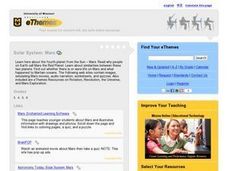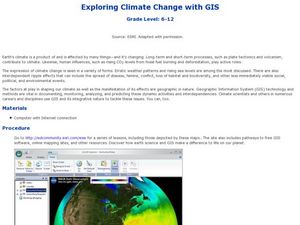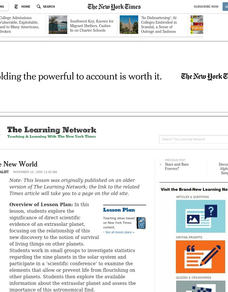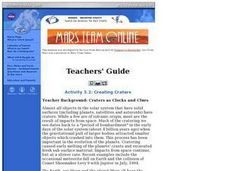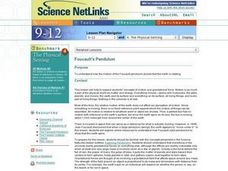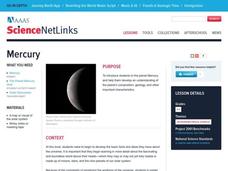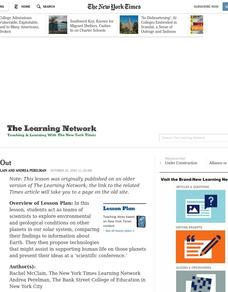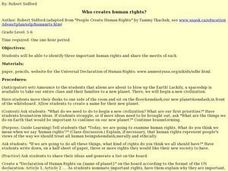Curated OER
Global Warming – More or Less
Eighth graders identify the factors that contribute to global warming. In this earth science activity, 8th graders evaluate the impact of global warming on the planet. They discuss their views within the group.
Curated OER
Soil Comparison and Analysis
High schoolers perform tests on different soil samples. In this earth science activity, students classify the soil into groups according to test results. They write a lab report following a certain criteria.
Curated OER
Solar System: Mars
Young scholars research Mars, read why it is called the Red Planet and find out whether there is or was life on Mars.
Curated OER
Exploring Climate Change with GIS
Students investigate climatological changes that are occurring to the Earth. For this climate change lesson, students access an assigned web site to view maps and lessons that show how climate change makes a difference to life on Earth.
Curated OER
Geology and it’s Influence
Students compare current geological map and the one from 1800's. In this earth science lesson, students discuss differences between the two and explain the factors that caused the change. They write an essay about how these changes...
Curated OER
Biomes: Extreme Climate
Middle schoolers discuss the causes of global warming. In this earth science lesson, students examine how global warming is connected to the arctic and world climate. They write a paragraph about their interconnection.
Curated OER
Astronomy and Me: Moons Over New Haven
Third graders study the features of different moons orbiting the planets. For this astronomy lesson, 3rd graders explore the different phases of the moon using an interactive online website. They compare and contrast the features of the...
Curated OER
A Whole New World
Young scholars work in small groups to investigate statistics regarding the solar system and participate in a 'scientific conference'. They explore available information about the extrasolar planet and assess the importance of this...
Curated OER
Creating Craters
Students explore parts of an impact crater and compare and contrast craters found in Earth, the Moon, and Mars. Crater formation is modelled and the relationship of mass, velocity, and size of the projectile to the crater formation is...
Curated OER
Foucault's Pendulum
Students investigate how the motion of the Foucault pendulum proves that the Earth is rotating. They research the Internet about pendulums and conduct an experiment online. They view a multimedia presentation about pendulums and read...
Curated OER
Space Science
Eighth graders study the objects in our solar system. In this space instructional activity students identify and describe planets, then classify them as terrestrial or gaseous.
Curated OER
Mercury
Students study the planet Mercury and develop an understanding of the planet's composition, geology, and other important characteristics. They explore a Web resource on the planet Mercury which is the central focus of this lesson.
Curated OER
Spacing Out
Students explore environmental and geological conditions on other planets in our solar system, comparing their findings to information about Earth. They propose technologies that might assist in supporting human life on those planets.
Curated OER
Moons Of The Solar System
Students investigate the solar system and its moons. They conduct research in groups to find information. Also the teacher uses models of the planets in order to teach different facts about the solar system through the use of...
Curated OER
Meteorites
Students model how meteors fall to the surface of planets. In this space science lesson, students identify different types of meteorites using an interactive online website. They investigate the relationship between a meteorite's size...
Curated OER
The Greening of Mars: The Changes Necessary to Sustain Life on Mars
Fifth graders discuss the currents conditions on the planet of Mars. In groups, they work together to develop a mechanism that allows for a balanced ecosystem to survive on the planet. After presenting their ideas to the class, they...
Curated OER
Who Creates Human Rights?
Students examine the importance of human rights. They participate in a simulation of starting a new civilization on another planet, create a class "Declaration of Human Rights," and write a journal entry based on class discussion...
Curated OER
Weight A Minute
Students watch a video and engage in hands-on activities which introduce scientific information made real through re-cognition and understanding the phenomena of gravitational force and how it impacts life on our planet.
Curated OER
Cosmic Wheels
Students build a scale model of the Solar System and determine the time other planets take to travel around the Sun in comparison to the time of the Earth's revolution. The velocity of the planets are also determined in this lesson plan.
Curated OER
Space Science: Journey Through the Solar System
Learners explore the Solar System and examine the characteristics of al the planets. Through research and discussion, they create catalogs of the Solar System's components. Next, students use their findings to create Powerpoint...
Curated OER
Living On The Moon
Learners evaluate what life would be like living on the moon or another planet in our solar system. In this science lesson, students create a colony that they would use to live in on the moon using Legos.
Curated OER
The Sun in Our Lives
Third graders identify the different parts of the sun. In this astronomy lesson plan, 3rd graders examine how the sun's energy drive life processes on Earth. They construct a model of a solar system using large rolls of toilet paper.
Curated OER
How Much Water is There?
Students investigate the amount of fresh water on earth and which water can be used for consumption. For this fresh water lesson plan, students calculate the amount of fresh water that can be used for consumption on earth. They use a 5...
Curated OER
Astronomy Merit Badge
Learners explore astronomy through the Starry Night Constellation Adventure software. They print star charts and identify constellations. They sketch the Big Dipper and describe the Milky Way. They list the five most visible planets and...


